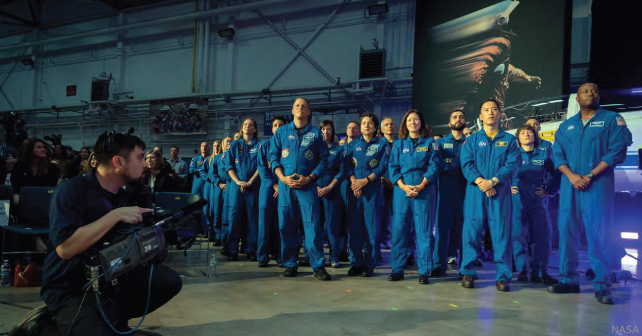
“The engineering aspect to our training teaches us how to integrate medicine into the design of the spacecraft, from spacesuits to medical devices,” Dr. Aintablian explains. “Given the mass and physical space restrictions, we need to learn how to make things smaller, lighter, and smarter, and we need to learn how to communicate and interface with our engineers in that regard.” A space physician, then, must be trained in the foundations of engineering design but must also improvise with limited resources. Perhaps this is why EM physicians can be such a natural fit for the role—we are an inventive field that thrives in critical thinking and innovation.
Explore This Issue
ACEP Now: Vol 42 – No 05 – May 2023
The crew of NASA’s Artemis II mission (left to right): NASA astronauts Christina Hammock Koch, Reid Wiseman (seated), Victor Glover, and Canadian Space Agency astronaut Jeremy Hansen. (Click to enlarge.)
Although both new space-medicine fellowship programs are currently for EM-trained physicians only, all three space physicians are hopeful that this will change. “EM doctors are certainly not the only ones who should be training to fill this gap,” Dr. Heft states. “We are currently diving into this field of providing acute care in space, but we are only one component of the cadre of doctors that will be needed to make humans a multi-planetary species. It’s a team effort and doesn’t belong to just one medical specialty. Of course, the ultimate priority is the safety of the crew and the combination of both preventative and acute care to ensure their safe return.” Their views on diversity extend to space travel as well, and they embrace the expansion of space travel to non-NASA astronauts as a natural next step in the development and evolution of space flight. As Dr. Aintablian puts it, “If space isn’t accessible to everyone, even to people with chronic medical problems, then it’s really not as exciting.”
Job opportunities for well-trained space-medicine doctors continue to grow, from NASA to the private space industry. The applications of their innovations, however, are not just limited to space. The technologies from space adapt to extreme environments or resource-limited settings on Earth. As Dr. Lehnhardt explains, “Some of our biggest obstacles in space include communication delays, limited diagnostic capability, and resource efficiency. We are at the forefront of developing new technologies for these austere settings.” One example Dr. Lehnhardt gives is a current NASA project to create intravenous fluids from potable water. This strategy avoids wasting expired intravenous fluids in space; on Earth the process could see use in disaster zones or remote rural hospitals.
Pages: 1 2 3 4 | Single Page




2 Responses to “Space Medicine: Emergency Physicians Voyage Into the Final Frontier”
July 14, 2023
Aerospace medicine academicians.10 minutes lost in eternity reading this shallow writing project by an ER resident. Not a single source from experienced space medicine physicians, nor a contrast from medical associations producing knowledge about human space exploration, not even a hint of research about basic space physiology. The delusional scenario of an astronaut with cholecystitis should have been enough warning. Expect major backlashes from accredited organizations, educational programs and think-tanks once they endure reading this dystopian review.
August 28, 2023
Terence Alost, MD MBA FAAEMOk, I read the reply above, I have been teaching science since the 80s and Emergency Medicine since the 90s (and I grew up on the Space Coast during the 70s and worked testing parts of the Shuttle in the 80s.) So, is the article extremely rigorous in its scientific value or rigor? No, but so what! It is sort of, science fiction or just an article, but SO WHAT! If the article sparks the interest of a young physician or physician-to-be to work in that field, then that’s a fantastic thing. Those of us older than 45, 50, 55, 60 etc. “know” that we are smarter than our childish 28 t0 32-year-old colleagues! I’m old< I guess. (Unless you're dumb or they are exceptionally smart, that is true.) It, however, is NOT ABOUT WHO IS SMARTER! It is about who is more experienced. It is not important to brag about experience. It is a DUTY to pass that experience on to the next generation. And it will be their exact job 20 to 30 years later.
So, to the author of the last criticism, I get it. Scientifically speaking, perhaps the article is goofy. But if that article sparks the interest of a 15-year-old somewhere, maybe they will do something incredible 30-40 years from now. I don't know your age. I am quite healthy (currently) and might still be alive at age 100+ or I could be gone. However, all of us need to work to make medicine and the world better for the times after we are gone.